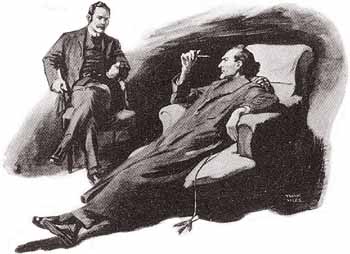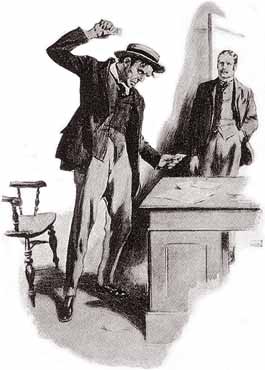| The Retired Colourman 2 | The Retired Colourman 3 |
It was late that evening before I returned to Baker Street and gave an account of my mission. Holmes lay with his gaunt figure stretched in his deep chair, his pipe curling forth slow wreaths of acrid tobacco, while his eyelids drooped over his eyes so lazily that he might almost have been asleep were it not that at any halt or questionable passage of my narrative they half lifted, and two gray eyes, as bright and keen as rapiers, transfixed me with their searching glance.
“The Haven is the name of Mr. Josiah Amberley’s house,” I explained. “I think it would interest you, Holmes. It is like some penurious patrician who has sunk into the company of his inferiors. You know that particular quarter, the monotonous brick streets, the weary suburban highways. Right in the middle of them, a little island of ancient culture and comfort, lies this old home, surrounded by a high sun-baked wall mottled with lichens and topped with moss, the sort of wall– –”

“Cut out the poetry, Watson,” said Holmes severely. “I note that it was a high brick wall.”
“Exactly. I should not have known which was The Haven had I not asked a lounger who was smoking in the street. I have a reason for mentioning him. He was a tall, dark, heavily moustached, rather military-looking man. He nodded in answer to my inquiry and gave me a curiously questioning glance, which came back to my memory a little later.
“I had hardly entered the gateway before I saw Mr. Amberley coming down the drive. I only had a glimpse of him this morning, and he certainly gave me the impression of a strange creature, but when I saw him in full light his appearance was even more abnormal.”
“I have, of course, studied it, and yet I should be interested to have your impression,” said Holmes.
“He seemed to me like a man who was literally bowed down by care. His back was curved as though he carried a heavy burden. Yet he was not the weakling that I had at first imagined, for his shoulders and chest have the framework of a giant, though his figure tapers away into a pair of spindled legs.”
“Left shoe wrinkled, right one smooth.”
“I did not observe that.”
“No, you wouldn’t. I spotted his artificial limb. But proceed.”
“I was struck by the snaky locks of grizzled hair which curled from under his old straw hat, and his face with its fierce, eager expression and the deeply lined features.”
“Very good, Watson. What did he say?”
“He began pouring out the story of his grievances. We walked down the drive together, and of course I took a good look round. I have never seen a worse-kept place. The garden was all running to seed, giving me an impression of wild neglect in which the plants had been allowed to find the way of Nature rather than of art. How any decent woman could have tolerated such a state of things, I don’t know. The house, too, was slatternly to the last degree, but the poor man seemed himself to be aware of it and to be trying to remedy it, for a great pot of green paint stood in the centre of the hall, and he was carrying a thick brush in his left hand. He had been working on the woodwork.
“He took me into his dingy sanctum, and we had a long chat. Of course, he was disappointed that you had not come yourself. ‘I hardly expected,’ he said, ‘that so humble an individual as myself, especially after my heavy financial loss, could obtain the complete attention of so famous a man as Mr. Sherlock Holmes.’
“I assured him that the financial question did not arise. ‘No, of course, it is art for art’s sake with him,’ said he, ‘but even on the artistic side of crime he might have found something here to study. And human nature, Dr. Watson – the black ingratitude of it all! When did I ever refuse one of her requests? Was ever a woman so pampered? And that young man – he might have been my own son. He had the run of my house. And yet see how they have treated me! Oh, Dr. Watson, it is a dreadful, dreadful world!’
“That was the burden of his song for an hour or more. He had, it seems, no suspicion of an intrigue. They lived alone save for a woman who comes in by the day and leaves every evening at six. On that particular evening old Amberley, wishing to give his wife a treat, had taken two upper circle seats at the Haymarket Theatre. At the last moment she had complained of a headache and had refused to go. He had gone alone. There seemed to be no doubt about the fact, for he produced the unused ticket which he had taken for his wife.”
“That is remarkable – most remarkable,” said Holmes, whose interest in the case seemed to be rising. “Pray continue, Watson. I find your narrative most arresting. Did you personally examine this ticket? You did not, perchance, take the number?”
“It so happens that I did,” I answered with some pride. “It chanced to be my old school number, thirty-one, and so is stuck in my head.”
“Excellent, Watson! His seat, then, was either thirty or thirty-two.”
“Quite so,” I answered with some mystification. “And on B row.”
“That is most satisfactory. What else did he tell you?”
“He showed me his strong-room, as he called it. It really is a strong-room – like a bank – with iron door and shutter – burglar-proof, as he claimed. However, the woman seems to have had a duplicate key, and between them they had carried off some seven thousand pounds’ worth of cash and securities.”
“Securities! How could they dispose of those?”
“He said that he had given the police a list and that he hoped they would be unsaleable. He had got back from the theatre about midnight and found the place plundered, the door and window open, and the fugitives gone. There was no letter or message, nor has he heard a word since. He at once gave the alarm to the police.”
Holmes brooded for some minutes.
“You say he was painting. What was he painting?”
“Well, he was painting the passage. But he had already painted the door and woodwork of this room I spoke of.”
“Does it not strike you as a strange occupation in the circumstances?”
“ ‘One must do something to ease an aching heart.’ That was his own explanation. It was eccentric, no doubt, but he is clearly an eccentric man. He tore up one of his wife’s photographs in my presence – tore it up furiously in a tempest of passion. ‘I never wish to see her damned face again,’ he shrieked.”

“Anything more, Watson?”
“Yes, one thing which struck me more than anything else. I had driven to the Blackheath Station and had caught my train there when, just as it was starting, I saw a man dart into the carriage next to my own. You know that I have a quick eye for faces, Holmes. It was undoubtedly the tall, dark man whom I had addressed in the street. I saw him once more at London Bridge, and then I lost him in the crowd. But I am convinced that he was following me.”
“No doubt! No doubt!” said Holmes. “A tall, dark, heavily moustached man, you say, with gray-tinted sun-glasses?”
“Holmes, you are a wizard. I did not say so, but he had gray-tinted sun-glasses.”
“And a Masonic tie-pin?”
“Holmes!”
“Quite simple, my dear Watson. But let us get down to what is practical. I must admit to you that the case, which seemed to me to be so absurdly simple as to be hardly worth my notice, is rapidly assuming a very different aspect. It is true that though in your mission you have missed everything of importance, yet even those things which have obtruded themselves upon your notice give rise to serious thought.”
“What have I missed?”
“Don’t be hurt, my dear fellow. You know that I am quite impersonal. No one else would have done better. Some possibly not so well. But clearly you have missed some vital points. What is the opinion of the neighbours about this man Amberley and his wife? That surely is of importance. What of Dr. Ernest? Was he the gay Lothario one would expect? With your natural advantages, Watson, every lady is your helper and accomplice. What about the girl at the post-office, or the wife of the greengrocer? I can picture you whispering soft nothings with the young lady at the Blue Anchor, and receiving hard somethings in exchange. All this you have left undone.”
“It can still be done.”
“It has been done. Thanks to the telephone and the help of the Yard, I can usually get my essentials without leaving this room. As a matter of fact, my information confirms the man’s story. He has the local repute of being a miser as well as a harsh and exacting husband. That he had a large sum of money in that strong-room of his is certain. So also is it that young Dr. Ernest, an unmarried man, played chess with Amberley, and probably played the fool with his wife. All this seems plain sailing, and one would think that there was no more to be said – and yet! – and yet!”
“Where lies the difficulty?”
“In my imagination, perhaps. Well, leave it there, Watson. Let us escape from this weary workaday world by the side door of music. Carina sings to-night at the Albert Hall, and we still have time to dress, dine, and enjoy.”
| The Retired Colourman 2 | The Retired Colourman 3 |